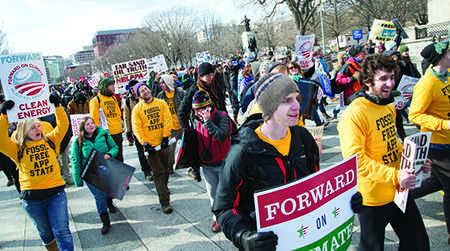 More than 150 Appalachian State students joined more than 40,000 protesters in Washington, D.C. this Sunday to protest the possible Keystone XL Pipeline.
More than 150 Appalachian State students joined more than 40,000 protesters in Washington, D.C. this Sunday to protest the possible Keystone XL Pipeline.
Appalachian students boarded buses and vans around 4 a.m. Sunday to arrive in D.C. in time for the rally at noon.
The protest in D.C. was organized by “Forward on Climate,” a group affiliated with the Sierra Club and 350.org.
After gathering at the Washington Monument to hear speeches from individuals such as 350.org resident Bill McKibben and U.S. Senator Sheldon Whitehouse, protesters marched down Pennsylvania Ave. to the White House.
Key issues being protested against included the construction of the Keystone XL Pipeline and unregulated fracking.
The Keystone XL Pipeline would run between Canada and Texas, connecting Transcanada’s oil sand where crude oil is extracted to refineries in Illinois and Texas and an oil distribution hub in Oklahoma.
Fracking is “the fracturing of shale deposits using highly pressurized fluids to release trapped natural gases,” said Dave Harman, cofounder of the Appalachian Institute of Renewable Energy. “The toxic fluids used in this process have leaked into natural water aquifers in places like Colorado and Pennsylvania, creating poisonous, even flammable tap water in homes.”
At least 30 states were represented at the protest. Michigan University student Conner Masten said that he was proud to march alongside Appalachian students who shared his concerns about the environment.
Appalachian sophomore sustainable development major Jacob Hooser was at the rally.
“I believe in power in numbers,” Hooser said, “So I came to D.C. to add another body to this important movement of our time.”
President Barack Obama was the intended audience of Sunday’s protest, although he was not actually in D.C. at the time.
For students, the trip to D.C. for the rally was completely free.
The total cost of the trip was $3,000, most of which was for transportation, including nine vans and one bus the group took, said instructor in the Department of Anthropology Harvard Ayers.
The funding for the trip was provided by numerous private donations and by 350.org, the group coordinating a worldwide effort to stop climate change, Ayers said.
Harman, who also helped organized the bus, said that if the trip was not free to students, it would have cost them $55 per person to ride on the bus and $25 per person to ride in a van.
Ayers said he and his wife personally chose to donate because they felt is was important for students to have the opportunity to go. Ayers said he knows not as many students would have been able to attend if the trip was not free.
Donations were also given from mPrints, a local printing company in Boone. The company gave $150 toward the group for T-shirts reading, “Fossil Free App Sate.”
Owner of mPrints Stuart Magnum said he chose to donate because he believes the group had an admirable goal.
“I can’t participate in everything that I try to support, so through my business I am able to support it in at least some way,” Magnum said.
Story: NOLEN NYCHAY, Intern News Reporter and STEPHANIE SANSOUCY, Senior News Reporter
Photo: OLIVIA WILKES, Senior Photographer

